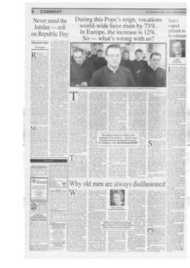Page 9, 22nd February 2002
Page 9

Report an error
Noticed an error on this page?If you've noticed an error in this article please click here to report it.
Tags
Share
Related articles
Newman And Conversion
Lives Remembered Fr Stanley Jaki Osb, Physicist And...
Happiness In Hell?
What Would Newman Make Of The Church Today?
Doctor Newman And The Communion Of Saints
Would Newman really have welcomed Vatican II?
Modern liberal scholars gloss over the great man's zeal for converts and his wish to save Anglicans from hell, says Michael Perron Newman to Converts: an Existential Ecclesiology by Stanley L Jaki, Real View Books, distributed by St Philip's Books, Oxford £19.95 To describe this book as a momentous breakthrough in Newman scholarship is barely an exaggeration. Let me begin to justify this claim by quoting Newman writing in 1885 to a Canon Loughman of Bath: "A few days pass without my having letters from strangers, young and old, men and women, on the subject of the Catholic religion. I answer that it ... is the one and only true and safe religion."
What Fr Jaki has done is to reveal for the first time what this fundamental conviction meant, in practical terms. for Newman. Hence the title "existential ecclesiology", a title which should not deter the reader. To reinforce the monumental task which the author has accomplished, it should be noted that, of the 30,000 or so letters of Newman published in Letters and Diaries, no one theme is as prevalent as ecclesiology and conversion.
In revealing this fact, Fr laid is able to uncover the distortion by so many Newman scholars, whom he derisively calls "Newmanists". In omitting such a theme, even Fr Ian Ker's much acclaimed scholarship is found wanting. (He is surprised to discover that, in Newman After A Hundred Years, edited by Fr Ker, no mention is made of Newman's zeal for converts.) Citing Newman as his authority. Fr Jaki delivers a broadside against some post-Vatican 11 developments in theology. The letters to converts reveal that his attacks are justified. Time and again he is able to demonstrate how these letters to converts or, rather, potential converts contrast with "Newmanist" scholarship. He even takes to task the commonly held view that Newman's "spirit" guided the Second Vatican Council. He writes: e [Newman) would have much to say about the official documents and even more so about the strategies and activism that made that council a lopsided reality and created an even more lopsided view of it." Readers who question Fr Jaki's interpretation, should consult these letters: it is as if a Pandora's box has been opened.
Another area is exposed where Newman is quoted misleadingly. There is no denying the fact that Newman saw the Vatican I definition of papal infallibility as "inopportune". He believed it would do no more harm than good. In correspondence with an Anglican, who was puzzled by the definition. it came as a great shock to Newman, rendering him speechless, when he realised that he was heading towards a Gallican view of authority if he continued to hold an inopportunist view.
The fact is that Newman was wrong about an "insolent faction" bringing pressure to bear for a definition. He was wrong about Pius IX bringing similar pres sure, and he was wrong about the effect among prospective converts in England. Already by 1872 Newman was seeing the definition as providential. Once again. Fr Jaki has cut the ground underneath "Newmanists" who resent papal authority.
Unlike other Newman scholars, Jaki not only acts as an editor and commentator; he somehow manages to bring alive Newman's voice from the letters themselves. Almost for the first time do we hear the priestly, pastoral Newman, addressing in his mellifluous voice the anxious souls wrestling with their eternal destiny. Newman brooks no compromise: the Catholic Church is the "one true fold-, and he meets any objections to this truth with a rigorous logic; but always, behind this logic. is the fear of damnation for those souls who resist the graces of conversion.
Central to Newman's theology of the Church was its visible oneness. His correspondence with Anglo-Catholics in particular attacks their three branch theory as being completely incompatible with the divine will. Throughout the book we see Newman returning to this theme. parrying the Anglo Catholic objections like an accomplished fencer. 'ma suddenly he strikes hone, and he receives aother letter telling of aother conversion, withIll the joy and gratitude sch a conversion elicits.
Fr Jakhas laid the founlation for an authatic renewal of Catholic eclesiology. If what is remled here were taken up fain in the seminaries male parishes, the flow of coverts into the Church wald almost certainly well again. Newman Ild the ruth in a way whictscaunds shocking to ourensitive ears. It produced pproxinately 5.000 conirts.
blog comments powered by Disqus













